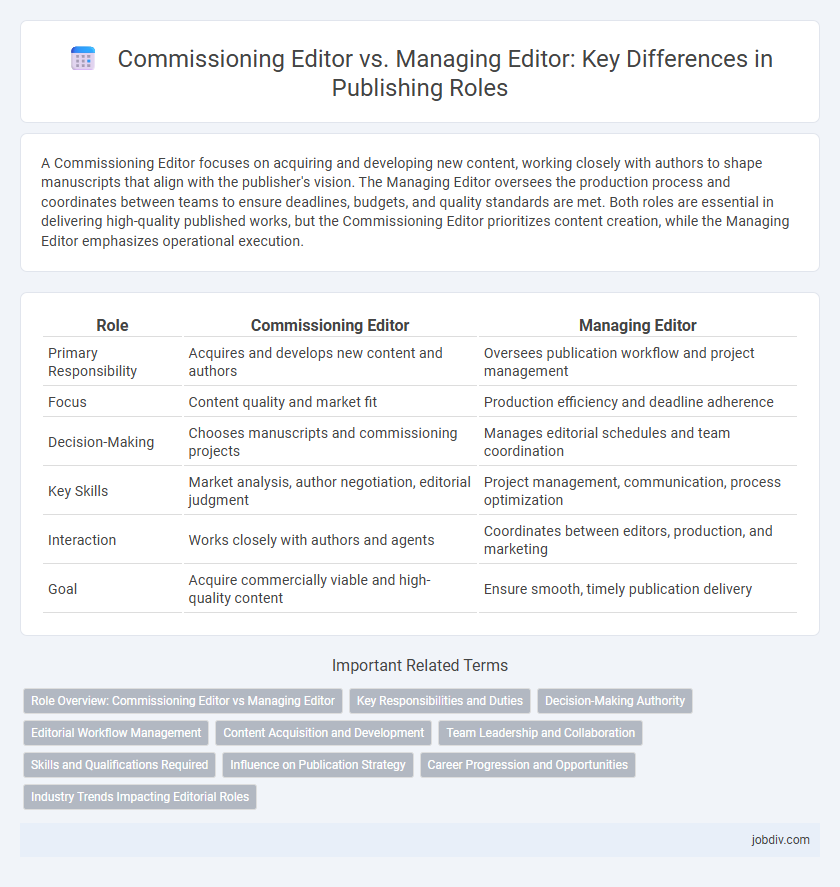A Commissioning Editor focuses on acquiring and developing new content, working closely with authors to shape manuscripts that align with the publisher's vision. The Managing Editor oversees the production process and coordinates between teams to ensure deadlines, budgets, and quality standards are met. Both roles are essential in delivering high-quality published works, but the Commissioning Editor prioritizes content creation, while the Managing Editor emphasizes operational execution.
Table of Comparison
| Role | Commissioning Editor | Managing Editor |
|---|---|---|
| Primary Responsibility | Acquires and develops new content and authors | Oversees publication workflow and project management |
| Focus | Content quality and market fit | Production efficiency and deadline adherence |
| Decision-Making | Chooses manuscripts and commissioning projects | Manages editorial schedules and team coordination |
| Key Skills | Market analysis, author negotiation, editorial judgment | Project management, communication, process optimization |
| Interaction | Works closely with authors and agents | Coordinates between editors, production, and marketing |
| Goal | Acquire commercially viable and high-quality content | Ensure smooth, timely publication delivery |
Role Overview: Commissioning Editor vs Managing Editor
A Commissioning Editor focuses on acquiring new content, identifying market trends, and collaborating with authors to develop manuscripts that align with the publisher's strategic goals. In contrast, a Managing Editor oversees the editorial process, coordinating between departments, managing schedules, and ensuring timely production and publication of content. Both roles are essential in the publishing workflow, with the Commissioning Editor driving content creation and the Managing Editor managing operational execution.
Key Responsibilities and Duties
A Commissioning Editor is primarily responsible for acquiring new content by identifying trends, commissioning authors, and overseeing manuscript development to align with the publisher's strategic goals. In contrast, a Managing Editor focuses on the operational workflow, managing the editorial calendar, coordinating between departments, and ensuring timely production and publication of materials. Both roles are essential in the publishing process, with the Commissioning Editor driving content creation and the Managing Editor ensuring seamless execution and quality control.
Decision-Making Authority
The Commissioning Editor holds primary decision-making authority over content selection, acquisitions, and editorial direction, shaping the publishing list by approving or rejecting manuscripts. The Managing Editor oversees the editorial workflow, managing schedules, budgets, and team coordination to ensure timely production but typically does not make high-level content decisions. This distinction places the Commissioning Editor at the forefront of strategic editorial decisions, while the Managing Editor focuses on operational execution within publishing houses.
Editorial Workflow Management
A Commissioning Editor primarily focuses on acquiring and developing content by identifying market trends and working closely with authors to shape manuscripts. In contrast, a Managing Editor oversees the editorial workflow management, ensuring deadlines are met, coordinating between departments, and maintaining production schedules. Both roles are essential for streamlined publishing operations, with the Commissioning Editor driving content strategy and the Managing Editor optimizing process efficiency.
Content Acquisition and Development
A Commissioning Editor specializes in acquiring new content by identifying market trends, developing author relationships, and commissioning manuscripts that align with the publisher's strategic goals. In contrast, a Managing Editor oversees the editorial workflow, coordinating between authors, editors, and production teams to ensure timely and quality content development. While the Commissioning Editor focuses primarily on content acquisition and strategic planning, the Managing Editor ensures the execution and refinement of the editorial process from manuscript submission to final publication.
Team Leadership and Collaboration
A Commissioning Editor leads content strategy by identifying new projects and collaborating closely with authors, agents, and marketing teams to curate a compelling publishing list. A Managing Editor oversees editorial workflow, coordinating between editorial staff, production, and design teams to ensure deadlines and quality standards are met efficiently. Both roles require strong leadership and communication skills to foster teamwork, but the Commissioning Editor focuses on creative vision while the Managing Editor manages operational execution.
Skills and Qualifications Required
A Commissioning Editor requires strong skills in market analysis, content curation, and author collaboration, often holding a background in literature, journalism, or publishing. A Managing Editor must possess expertise in project management, editorial workflows, and team leadership, typically with qualifications in editorial management or communications. Both roles demand exceptional organizational skills, attention to detail, and the ability to meet tight deadlines within the publishing industry.
Influence on Publication Strategy
A Commissioning Editor plays a crucial role in shaping publication strategy by selecting and developing content that aligns with market trends and audience demand, directly influencing the editorial vision and commercial objectives. The Managing Editor oversees the production process, ensuring that publication schedules, quality standards, and workflow efficiencies support strategic goals while coordinating among editorial, marketing, and production teams. Both positions collaborate to balance creative direction with operational execution, optimizing the publication's impact and reach in competitive markets.
Career Progression and Opportunities
Commissioning Editors specialize in content acquisition and development, often serving as the creative visionaries who shape a publication's offerings, making this role ideal for professionals aiming to influence editorial direction and expand content portfolios. Managing Editors concentrate on production workflows, team coordination, and deadline management, providing strong operational experience beneficial for advancing into senior editorial leadership or publishing management roles. Career progression from Commissioning Editor often leads to Editorial Director or Publisher, while Managing Editors frequently move into Executive Editor or Operations Director positions, reflecting distinct but complementary opportunities within publishing companies.
Industry Trends Impacting Editorial Roles
Industry trends such as digital transformation and content diversification are reshaping the roles of commissioning editors and managing editors, emphasizing adaptability and cross-platform expertise. Commissioning editors increasingly focus on curating innovative content that aligns with audience analytics and market demands, while managing editors prioritize streamlined production workflows and multi-channel project coordination. The rise of AI tools and data-driven decision-making is also driving collaboration between these roles to enhance editorial efficiency and content quality.
Commissioning Editor vs Managing Editor Infographic

 jobdiv.com
jobdiv.com